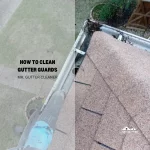Determining the best gutter guards is key for homeowners aiming to protect their homes from water damage, prevent pest intrusion, and maintain curb appeal. The most effective gutter guards combine efficiency in blocking debris, durability against weather elements, and compatibility with various gutter styles.
Screen gutter guards, known for their simplicity and effectiveness against large debris, might require more frequent cleaning for smaller particles.
Micro-mesh guards offer a comprehensive solution by blocking all debris types but may come at a higher cost.
Foam gutter guards, praised for easy installation, fit directly into gutters to prevent debris entry, though they may need regular replacement.
Brush gutter guards, consisting of bristles that trap debris while allowing water to flow, are simple to install but might struggle with smaller particles.
Surface tension guards, requiring professional installation, use the principle of surface tension to deflect debris while capturing water.
Homeowners should consider their specific environmental conditions, gutter types, and maintenance preferences when selecting the best gutter guards, ensuring a blend of functionality, aesthetics, and long-term value.
Introduction to Gutter Guards
Gutter guards are a crucial component in home maintenance, designed to safeguard homes from the common issues caused by clogged gutters. These guards are vital in preventing blockages by leaves and debris, thereby ensuring the efficient flow of water away from the home’s foundation.
Importance of Gutter Guards in Home Maintenance
Gutter guards play a significant role in maintaining the structural integrity of a home. By preventing gutter clogs, they help avoid water overflow, which can lead to foundation damage, landscape erosion, and basement flooding. Additionally, gutter guards reduce the likelihood of pest infestations by eliminating stagnant water and debris buildup, key attractants for pests. Regular cleaning and maintenance of gutters can be laborious and risky; gutter guards provide a practical solution, minimizing the need for frequent gutter cleanings.
Evaluating the Best Gutter Guards for Your Home
Selecting the best gutter guards requires careful consideration of several factors. Homeowners should assess the type of foliage surrounding their property, as different guards are better suited for different types of debris. The compatibility of the gutter guard with the existing gutter system is also crucial to ensure effective protection. Durability and maintenance requirements of the gutter guards are additional key considerations, as these factors directly impact the long-term effectiveness and cost-efficiency of the gutter protection system.
Types of Gutter Guards
Understanding the various types of gutter guards is crucial for homeowners to make an informed decision that aligns with their home’s specific needs. Each type offers unique benefits and challenges.
Screen Gutter Guards
Screen gutter guards are characterized by their large holes, making them effective at blocking large debris like leaves and twigs. Their easy-to-install nature makes them a popular choice. However, they might require more frequent cleaning to manage smaller particles, which can still pass through the screen.
Micro-Mesh Gutter Guards
Micro-mesh gutter guards feature a fine mesh that can filter out all types of debris, including small particles like pine needles. They are known for their durability and comprehensive protection. While they offer excellent debris filtration, they are often more expensive than other types.
Foam Gutter Guards
Foam gutter guards fit directly inside the gutter, blocking debris from entering. They are straightforward to install and are a good solution for blocking larger debris. However, they may retain moisture and require more frequent replacements compared to other types.
Brush Gutter Guards
Brush gutter guards consist of bristles that fit into gutters, trapping debris while allowing water to pass through. They are easy to install but may not be as effective against smaller debris, which can get caught in the bristles and require cleaning.
Surface Tension Gutter Guards
Surface tension gutter guards, also known as helmet-style guards, work on the principle of surface tension. Water adheres to the guard and flows into the gutter while debris falls off the edge. These require professional installation and can be highly effective but may be visible from the ground, potentially affecting the home’s aesthetic.
Factors to Consider When Choosing Gutter Guards
Selecting the right gutter guards for a home involves considering several key factors. This ensures that the guards effectively meet the home’s specific needs, contributing to long-term maintenance and protection.
Compatibility with Your Gutter System
The compatibility of gutter guards with the existing gutter system is crucial. Homeowners need to ensure that the guards fit well with their gutters in terms of size, shape, and design. Incompatible guards can lead to poor performance, increased debris accumulation, or even damage to the gutter system.
Environmental Considerations
Environmental factors play a significant role in the selection of gutter guards. The type of foliage surrounding the property, such as pine needles or broad leaves, and the local climate, including rainfall frequency and intensity, should guide the choice of guards. These factors determine the amount and type of debris the guards need to handle.
Durability and Maintenance Requirements
The material and build quality of gutter guards affect their durability and maintenance needs. Materials like aluminum or stainless steel offer longevity and withstand harsh weather conditions. Homeowners should also consider the ease of cleaning and maintenance, as some gutter guards might require more frequent attention than others.
Installation and Maintenance of Gutter Guards
The installation and ongoing maintenance of gutter guards are pivotal in ensuring their effectiveness and longevity. Proper installation and regular upkeep can significantly impact their performance and the overall health of a home’s gutter system.
Professional vs. DIY Installation
When it comes to installing gutter guards, homeowners face a choice between professional installation and a do-it-yourself (DIY) approach. Professional installation ensures that the gutter guards are correctly fitted, which is crucial for their optimal performance. Professionals can also provide valuable insights into the best type of guard for a specific gutter system and home environment. On the other hand, DIY installation can be more cost-effective and offers homeowners a hands-on approach. However, it requires a good understanding of gutter systems and a level of skill to ensure proper installation.
Maintenance Tips for Long-Term Efficiency
Regular maintenance of gutter guards is essential to sustain their efficiency and prolong their lifespan. This includes periodic checks for any clogs or debris accumulation on the guards themselves. Depending on the type of gutter guard, some may need more frequent cleaning or occasional adjustments. Homeowners should also inspect their gutters and guards after severe weather events to ensure they remain intact and functional. Understanding and adhering to the specific maintenance needs of the chosen gutter guard type can prevent potential issues and ensure that the gutters remain effective in protecting the home from water damage.
Comparing the Effectiveness of Different Gutter Guards
When selecting gutter guards, homeowners must consider the effectiveness of various types available on the market. Each type serves the primary purpose of keeping gutters free from debris while allowing water to flow unimpeded. The effectiveness of gutter guards can significantly vary based on the design, material, and installation method, impacting overall home maintenance efficiency.
Pros and Cons of Each Type
Mesh Gutter Guards:
Pros: Excellent at blocking fine debris; durable.
Cons: Higher cost; professional installation recommended.
Reverse Curve Gutter Guards:
Pros: Direct water flow effectively; low maintenance.
Cons: Visible from the ground; specific roof compatibility.
Bottle Brush Gutter Guards:
Pros: Easy DIY installation; inexpensive.
Cons: Require frequent cleaning; less effective against small debris.
Foam Gutter Guards:
Pros: Simple installation; blocks most debris.
Cons: Can deteriorate over time; potential for water overflow.
Screen Gutter Guards:
Pros: Affordable; blocks large debris.
Cons: Can clog with small particles; may need regular cleaning.
User Reviews and Ratings
User reviews and ratings are vital for assessing the real-world effectiveness of gutter guards. Positive feedback often highlights ease of installation, effectiveness in preventing clogs, and durability. Negative reviews, conversely, may point out issues with fit, maintenance requirements, and performance during heavy rainfalls. Prospective buyers should weigh these insights to choose the best option for their homes.
Cost Considerations for Gutter Guards
The cost of gutter guards is a critical factor for homeowners. Prices vary widely based on material, design complexity, and installation needs. Investing in gutter guards can save money in the long term by reducing the need for gutter cleaning and potential water damage repairs.
Price Range of Different Types
- Mesh Gutter Guards: Higher-end, with costs influenced by material quality.
- Reverse Curve Gutter Guards: Moderate to high cost, depending on brand and material.
- Bottle Brush Gutter Guards: Low cost, appealing for budget-conscious homeowners.
- Foam Gutter Guards: Generally inexpensive, but with varying lifespan.
- Screen Gutter Guards: Cost-effective, with a broad range of prices based on material.
Balancing Cost with Quality and Effectiveness
Achieving the right balance between cost, quality, and effectiveness is crucial. High-quality gutter guards that are slightly pricier upfront can offer better protection and durability, potentially saving money on maintenance and repair costs. Homeowners should consider their specific needs, such as the type of debris commonly faced and the climate, to make an informed decision.
Conclusion and Recommendations
In conclusion, the selection of gutter guards should be tailored to individual home maintenance needs, considering the specific challenges each homeowner faces. Effectiveness, cost, and user feedback are all crucial factors in this decision-making process.
Summarizing the Best Gutter Guard Options
The best gutter guard options offer a balance of efficiency, durability, and cost-effectiveness. Mesh and reverse curve guards are suitable for those seeking long-term solutions and are willing to invest more upfront. Foam and bottle brush guards offer simplicity and lower costs but may require more maintenance.
Final Tips for Making an Informed Decision
Homeowners should carefully evaluate their home’s surroundings, typical debris types, and budget before choosing gutter guards. Consulting with professionals for installation and reading up on user reviews can provide additional insights, ensuring the selection of the most effective gutter guards for maintaining home integrity.


